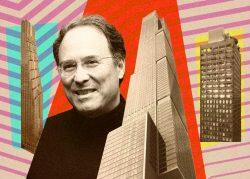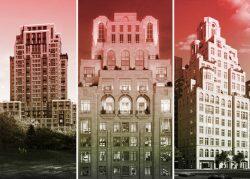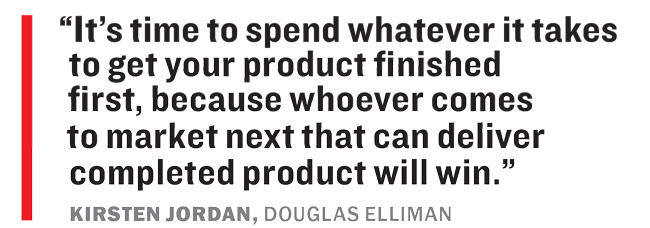It will take more than another Covid variant and a shifting economic outlook to dim Lightstone’s spirits.
The developer behind the David Adjaye-designed condo tower at 130 William Street is riding high after a frenzied year for the city’s new development market, when it closed sales on more than 150 units at full ask. Scott Avram, Lightstone’s senior vice president of development, is among those who believe the boom is just beginning.
“I don’t think it will slow down, with the caveat that you don’t know what’s ahead or if there’ll be any sort of other [Covid] variant,” Avram said. “I think people understand the virus, and there’s a certain conditioning that’s already taking place.”
That’s a lot of optimism at a time when omicron is not the only source of uncertainty in the market. The exceptionally low mortgage rates that helped escalate demand in the housing market last year are now rising again, and experts predict that home sales and price growth will slow in the coming months.
Meanwhile, inflation has climbed to a 39-year high, and agents remain hungry for an anticipated return of international buyers that has yet to noticeably materialize.
Yet as Avram tries to keep track of the 30 to 40 weekly inquiries he says 130 William has received in these normally sleepy winter months, the chance of another banner year is worth betting on.
“I don’t think people are overspeculating and jumping just to buy anything; I think they’re savvy and they’re smart,” Avram said. “Stronger condos will continue to sell with strong velocity and at good numbers, and I think the weaker ones will continue to suffer.”
Read more


A Tale of Two Years
New development sales opened the year on a strong note. The first week of 2022 saw 80 contracts signed in the city at an average asking price of $1,703 per square foot, compared to 58 contracts averaging $1,660 per square foot in the same week last year.
A year ago, investors who were flush with capital eyed pandemic-era discounts to beef up their portfolios, but many of those bargains never materialized. The market picked up faster than the players had anticipated, Marketproof CEO Kael Goodman said. Developers were able to refinance, giving them more time to move their inventory as sales ramped up through the spring.
Last year “started with institutional buyers expecting to buy bulk condo deals,” Goodman said. “That’s not where we are at all today.”
Celebrity broker Ryan Serhant remembers riding with clients in a stretch Escalade with the windows down and middle seats vacant. Thanks to vaccinations, the “palpable” Covid fears that clouded some sales have cleared, opening up more opportunities, Serhant said.
“Covid is still there, omicron is still obviously very there, but people are coming back to work, people are going back to normal,” Serhant said.
Although adequate supply remains, brokers are working with fewer units than last year. While there may be less negotiability, Corcoran Sunshine President Kelly Mack doubts there will be huge price increases — at least in the near term.
“Over the next few years we’re going to see some real price appreciation again,” she said. “The inventory coming to market is not coming fast enough to replenish the increased demand that we saw in 2021, and what I believe we’ll see even more of in 2022.”
Betting on the buyers
As some agents have learned, high expectations can lead to disappointment.
The number of foreign buyers in New York City plummeted during the pandemic and has yet to recover. Some agents were hopeful that the lifting of international travel restrictions in November would provide an already busy year with an extra boost. That didn’t happen.
“The international buyers are taking a little bit longer in their process in deciding to come,” said Douglas Elliman’s Kirsten Jordan. “Everybody for a little while was like, ‘I wish I could get over there because there’s all these deals,’ and now a lot of people call and ask me if those deals are gone.”
“Investing in New York City is a luxury, not a must, and so they’re busy taking care of other stuff at home,” Jordan added.
Still, agents haven’t lost hope. Mack said she believes this is the year foreign buyers return en masse — it’s just a matter of when.

“With all of the pent-up demand that has grown over the last two years in that sector, I think that we’re going to see major increases this year,” Mack said.
In the meantime, locals have continued to dominate the market, pouring money into new developments Downtown and on the Upper East and Upper West sides.
Rents, meanwhile, have gotten so high that some have figured they might as well buy instead, Mack explained. Impatient buyers who don’t want to wait for backed-up furniture or repairs are also fueling the market for move-in-ready, furnished units. Agents expect them to continue flocking to turnkey homes this year, even if that means broadening their search as availability dwindles.
“I’ve sold more fully furnished apartments in the last year than I ever had in my entire career,” Serhant said. “Sometimes, the furniture isn’t even good or nice. But because of supply chain issues — go on Restoration Hardware right now and try to buy a couch, I dare you.”
With fewer units entering the market in the luxury sector to make up for those absorbed last year, Mack and Jordan both expect to see a shift in where buyers head next, with Midtown, Kips Bay and Hudson Yards identified as possible targets.
“For the developers that have stuff in the pipeline that are in the phases of construction, I think it’s time to spend whatever it takes to get your product finished first, because whoever comes to market next that can deliver completed product will win,” Jordan said.
Economic hiccups, not hurdles
Ari Goldstein, senior vice president of development at Extell Development, said that supply chain issues have been “overblown,” though it does help that Extell’s 68-story Brooklyn Point — another top-performing building last year in terms of closings — can provide turnkey homes for clients.
“If you’re financing, the normal time it would take to get your mortgage, you can use that time to get all your furnishings in order,” Goldstein said. “There’s still so many options of where you can buy wonderful sofas, tables and chairs and lights. There’s lots of great things that don’t have delays.”
Also not a big concern to Goldstein? Rising mortgage rates. Even after climbing to a 22-month high in recent weeks, the average 30-year fixed-rate mortgage was still down almost 20 percent from January 2019.
“Even if it creeps up a little bit, it’s still so far below what rates used to be,” Goldstein said.
Avram echoed that sentiment, adding that if anything, he expects the rising rates to create even more activity in the market as observant buyers move quickly to lock in the best deals before they’re gone.
And while rising inflation may prompt the Federal Reserve to hike interest rates, it is unlikely to have a material impact on wealthy New York buyers.
“There’s enough demand and enough wealth that I don’t think those two factors are going to have a significant impact [on the high-end sector in New York],” Mack said.
But if history is any indication, there’s reason to believe the current market is unsustainable. Thad Wong, co-founder and CEO of the Chicago-based brokerage @properties, noted the converging factors that led to a run on housing last year: a decade of steady economic growth and wealth creation immediately preceding a pandemic that had people spending more time at home than ever before.
“But they call them hot markets because they don’t last forever,” Wong said. “I don’t think it’s going to crater by any means, but there is no way you can sustain 2021. Oftentimes after you have a really hot market, people rely on that and think it’s the new normal. People have an incredibly short memory, but it’s just not.”
Even with the changing conditions, developers are choosing to sit back and enjoy the ride. Avram expects 130 William to sell out by the time construction is completed this year. Brooklyn Point’s extensive luxury amenity package helps drive buyers to the building. There’s no need to change any strategies, they say; this market runs itself.
As for Serhant, the goal is simple: world domination.
“I’m not really joking; 2020 taught us that life is short, and my goal is to go for broke,” Serhant said. “My only option is to win and beat everybody.”
